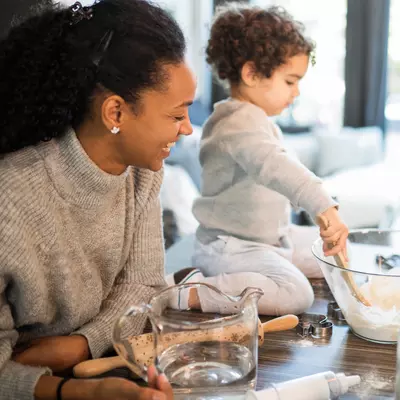- AdventHealth

The impact of severe winter weather can range from a few closed roads to city-wide power outages. And when it affects your family, you might feel overwhelmed by how to prepare and protect your home and loved ones.
But there are a few extremely important safety tips to remember as you work to stay comfortable until a winter storm passes and your neighborhood is back to normal.
Read on to ensure you understand potential health risks and safety hazards as you hunker down in a winter storm, as well as effective ways you can maximize the warmth.
Staying Safe Indoors During a Winter Storm
- Bring animals inside before a winter storm hits to protect them from hypothermia and dehydration
- Keep refrigerator and freezer doors closed as much as possible: An unopened refrigerator will keep food cold for about 4 hours; a full freezer will keep its temperature for about 48 hours (24 hours if it is half full) as long as the door remains closed
- Listen to a local station on a battery-powered radio for updated emergency information
- Stay hydrated; avoid caffeine and alcohol
- Stay indoors as much as possible and wear layers of loose-fitting, lightweight, warm clothing
- Turn off or disconnect any appliances, equipment or electronics you were using when the power went out; when the power comes back on, surges or spikes can damage equipment
- Use flashlights in the dark, not candles
Heating Your Home Safely During a Power Outage
- Don’t leave pets and children unattended near any heat source
- If you use a space heater, place it on a level, hard and nonflammable surface, not on rugs and carpets, or near bedding and drapes
- If you’re using a generator, be sure you understand the risks of carbon monoxide (CO) poisoning and how to use generators safely
- If you start to feel sick, dizzy, or weak while using a generator, get to fresh air right away
- Install CO alarms in central locations on every level of your home and outside sleeping areas to provide early warning of carbon monoxide; CO can't be seen or smelled, and it can rapidly lead to illness and death
- Never leave a fire in the fireplace unattended; use a glass or metal fire screen to keep fire and embers in the fireplace
- Never use a cooking range or oven to heat your home
- Never use a generator, grill, camp stove or other gasoline, propane, natural gas or charcoal-burning device inside a home, garage, basement, crawlspace or any partially enclosed area
- Leave at least three feet of space around a heater
- Only use the type of fuel your heater is designed for — don’t substitute
- Plug space heater power cords directly into outlets, never into an extension cord
- Turn off portable space heaters every time you leave the room or go to sleep
Tips for Being Outdoors in Cold Weather
- Avoid overexertion and strain from strenuous activity like walking through deep snow or shoveling snow for long periods; sweating could lead to a chill and hypothermia
- Change out of wet clothes immediately to avoid rapid loss of body heat
- Walk slowly and carefully on snowy, icy sidewalks
- Watch for signs of hypothermia and frostbite [RK1]
- Wear warm, layered clothing and water-repellent exterior layers
Securing Your Home During a Winter Storm
- Close off unused rooms
- Conserve energy and fuel by lowering your thermostat to the lowest tolerable temperature
- Cover the windows at night
- Feel for drafty areas around windows and doors and use towels or rags to block gaps
- Learn how to prevent frozen pipes which can burst and cause flooding and damage
- Some gas-fueled heaters require ventilation; if you don’t need extra ventilation, keep as much heat as possible inside your home by sealing doors and windows
Finding Emergency and Urgent Care Close to Home
Your whole health is our priority through every season. And we’re here to provide the information and resources you need to help keep your family safe. Learn more about our emergency and urgent care services here.



